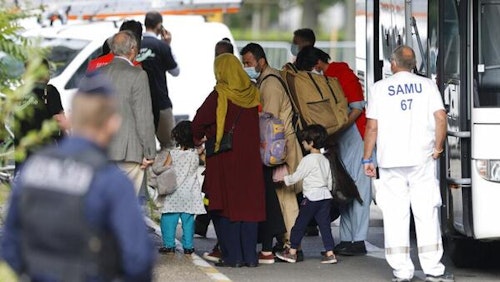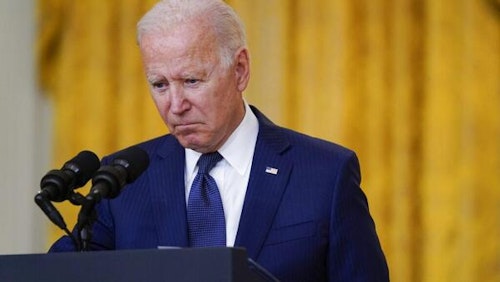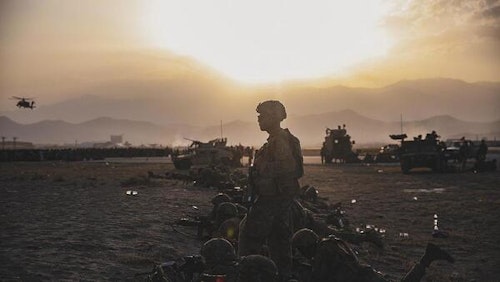The so-called Islamic State carried out two suicide bombings outside Kabul's airport, after warnings from the US, UK and Australia that a terror attack in the area could be imminent.
The so-called Islamic State carried out two suicide bombings near the Kabul airport on Wednesday, killing US soldiers and Afghan civilians.
 ADVERTISEMENT
ADVERTISEMENT
 ADVERTISEMENT
ADVERTISEMENT
At least 13 US service members were killed and 18 more injured, the Pentagon said, officials warning that the toll could grow.
At least 72 Afghans were killed, according to two officials from the previous Afghan administration quoted on Friday by AFP -- up from Thursday's estimate of 60. Officials said on Thursday that another 140 were wounded.
The attacks followed several warnings that there was a risk of an imminent terror attack.
The IS affiliate in Afghanistan claimed responsibility for the attacks and said it targeted US troops and Afghan allies.
"We will not forgive. We will not forget. We will hunt you down and make you pay," warned US President Joe Biden, speaking from the White House. "I will defend our interests and our people with every measure at my command."
The explosions, confirmed by the US and the German military, occurred around 3:20 pm CEST.
It comes as thousands of Westerners and Afghans scramble to get on flights out of the country before the deadline of August 31, seen as a red line by the Taliban.
Several countries, including Germany, have ended their evacuation efforts due to the security situation on the ground.
The US Pentagon has said they will continue their mission to evacuate US citizens, Afghans who worked with the international forces, and vulnerable Afghans.
"We continue to execute our number one mission which is to get as many American citizens and other evacuees as possible out of Afghanistan," said General Frank McKenzie, who is overseeing the operation at the Kabul airport.
"The plan is designed to operate while under stress and while under attack," he added.
Amrullah Saleh, who has claimed the office of acting president of Afghanistan since 17 August, has told Euronews he believes "the Taliban is behind today's bombing".
Just before the explosions, Kirby had tweeted that the US was not wrapping up its evacuation mission, and would continue up until the deadline of 31 August.
Abbey Gate is one of three access points to the airport where thousands of Afghans have been flocking for the past 12 days, anxious to leave the country now in the hands of the Taliban.
The French ambassador to Afghanistan, David Martinon, tweeted following the explosion: "To all our Afghan friends: If you are near the airport gates, get away urgently and take cover. A second explosion is possible."
Britain, the United States and Australia had been warning of an attack. They had issued urgent warnings telling their nationals to move away from Kabul airport as quickly as possible due to "terrorist" threats.
British Armed Forces Minister James Heappey told the BBC early Thursday there was ”very, very credible reporting of an imminent attack” at the airport, possibly within “hours.” Belgian Prime Minister Alexander De Croo said his country had received information from the U.S. and other countries about the “threat of suicide attacks on the mass of people”.
The acting US ambassador to Kabul, Ross Wilson, said the security threat at the Kabul airport overnight was “clearly regarded as credible, as imminent, as compelling.”
But in an interview with ABC News, he would not give details and did not say whether the threat remained.
Taliban spokesman Zabihullah Mujahid denied that any attack was imminent in the wake of those warnings.
Some countries have already ended their evacuations and begun to withdraw their soldiers and diplomats from the country, signalling the beginning of the end of one of history's largest airlifts.
The Taliban have pledged not to attack Western forces during the evacuation, but insist the foreign troops must be out by the deadline.

 ${title}
${title}
Live ended
Key updates on Afghanistan attacks
- 13 US service members killed in Kabul airport suicide bombings, Pentagon says, with 18 wounded
- At least 72 Afghans died and 140 were hurt in the attacks, officials say
- US to proceed with Afghanistan evacuations despite attack, Pentagon says
- Germany ends evacuations due to security situation, withdraws troops
- US President Joe Biden says 'we will make you pay' to IS terrorists behind the attack

Afghanistan live updates: Countries vow to continue Kabul evacuations
euronewsThe US, the UK and France have pledged to fly more people out on Friday, although operations are being wound down. The Pentagon has warned that more attempted attacks are expected.Biden warns ISIS: 'We will hunt you down and make you pay'

'We will hunt you down', Biden warns ISIS after deadly Kabul attacks
euronewsThe US president said the evacuation mission will continue despite Thursday's airport bombings, while the US military warns more attempted attacks are expected.Biden says it is in Taliban's interest to let evacuations continue ahead of deadline
Biden said that it was in the Taliban's interest that the US is able to leave Afghanistan "on time".
"They're acting in their interest," Biden said in defence of letting them stop vehicles and searching people outside the airport.
"It's in their self-interest that we leave when we said and that we get as many people out as we can," Biden said. "It's not a matter of trust. It's a matter of mutual self-interest."
US to find 'ways of our choosing' to get perpetrators
He said they would pay for the attacks that killed US service members and Afghan civilians.
'Tough day', Biden says as he denounces terror attacks in Kabul
Biden said his heart ached for families of the "heroes" who died in the attack.
"To those who carried out this attack... know this, we will not forgive. We will not forget. We will hunt you down and make you pay," Biden said. "I will defend our interests and our people with every measure at my command."
Biden added the mission was "dangerous" and that's why he wanted to "limit the duration". He has said the US would thus stick to the August 31st deadline for evacuations.
"We will not be deterred by terrorists. We will not let them stop our mission. We will continue the evacuation," Biden said.
Islamic State claims responsibility for attack outside Kabul airport
The so-called Islamic State group's affiliate in Afghanistan claimed responsibility for the attack outside the Kabul airport and said they had targeted US forces and Afghan allies, the AP reported.
The statement carried a photo of what the militant group said was the bomber who carried out the attack.
US to proceed with Afghanistan evacuations, Pentagon says
The Pentagon said that the US would proceed with evacuations at the Kabul airport despite two suicide bombings resulting in the deaths of Afghan civilians and US service members.
"We continue to execute our number one mission which is to get as many American citizens and other evacuees as possible out of Afghanistan," said General Frank McKenzie, the head of US Central Command who is overseeing the operation at the Kabul airport.
"The plan is designed to operate while under stress and while under attack," General McKenzie said, emphasising that the mission would continue.
He said the so-called Islamic State would likely be planning future attacks.
At least 60 Afghans killed in suicide bombings in Kabul, official says
US general says military will 'go after' perpetrators of Kabul attacks
US General Frank McKenzie said that the US would "go after" the perpetrators of the Kabul attacks if they could find who was responsible. He said the attack was carried about by Islamic State fighters.
"We've been very clear all along that we retain the right to operate against ISIS in Afghanistan," General McKenzie said.
"We're prepared to take action against them. 24/7 we are looking for them."
At least 12 US service members killed in Kabul airport attack, Pentagon says
The US Pentagon said that at least 12 US service members were killed in two suicide bombings outside the Kabul airport, and 15 others were injured.
They said the Islamic State terrorist group was behind the attacks.
Germany evacuates soldiers after Afghanistan attack, defence minister says
German soldiers were not injured in the attack, she added. The US Pentagon said that a number of US service members were killed in the attack. Two German soldiers were in the US part of the airport during the attack, Kramp-Karrenbauer said.
"I am glad and relieved that our soldiers who carried out this dangerous mission have just left the Afghan airspace safely," said Kramp-Karrenbauer.
She added that Germany had evacuated 5347 people from at least 45 nations.
"An extension of the operation in Kabul was not possible," she said, due to a worsening security situation and the decision of the Taliban.
'Barbaric attack'
The UK's evacuation operations from Afghanistan will continue despite "barbaric" attacks outside Kabul airport, British Prime Minister Boris Johnson said on Thursday.
"We will continue our operation. And we are now coming towards the end, the very end," the head of government said after an inter-ministerial crisis meeting.
Taliban condemns attack in ‘area where US forces are responsible for security’
A spokesman for the Taliban has said the group “condemns” the attack at Kabul airport.
“The Islamic Emirate strongly condemns the bombing of civilians at Kabul airport, which took place in an area where US forces are responsible for security,” tweeted Suhail Shaheen.
“The Islamic Emirate is paying close attention to the security and protection of its people, and evil circles will be strictly stopped.”
Von der Leyen condemns 'cowardly and inhuman attacks'
European Commission president Ursula von der Leyen has condemned the "cowardly and inhuman attacks" at Kabul airport.
She tweeted that the "international community must work closely together to avoid a resurgence of terrorism in Afghanistan and beyond".
'Taliban behind bombing' - acting Afghan president
Amrullah Saleh, who has claimed the office of acting president of Afghanistan since 17 August, has told Euronews he believes "the Taliban is behind today's bombing".
In an interview with Euronews he said: "As someone with an intelligence background, [I can say that] we knew from two or three days ago that the Taliban wanted to end the airport disaster with a series of bombings. They spread the world that ISIL wanted to carry out bombings. The Taliban is behind today's bombing”.
While many main government officials have fled the country, including Ashraf Ghani, president up until the Taliban takeover, Saleh has taken refuge in the Panjshir valley with some allies. Panjshir remains the only region so far not under the rule of the Taliban.
Read more about the ongoing resistance to the Taliban in Afghanistan here:

Analysis: Why did Kabul fall so easily into the Taliban’s hands?
euronewsEuronews' Masoud Imani Kalesar looks at the small print in Afghanistan's recent history to give us some ways to understand the recent developments.Macron: 'Situation has seriously deteriorated'
French President Emmanuel Macron said “the situation has seriously deteriorated” near Kabul airport after “several explosions happened in the last hours.”
Speaking in a news conference during a visit to Dublin, Ireland, Macron said “we are facing an extremely tense situation that makes us coordinate obviously with our American allies and call for the utmost caution in a context we don’t control.”
He added France will seek to protect and evacuate French nationals, people from allied countries and Afghans “as long as the conditions will be met” at the airport.
Macron said he did not have more details about the circumstances of the explosions.
World leaders briefed on explosions
The White House says US president Joe Biden has been briefed on the explosions outside Kabul airport.
In the UK, the prime minister's spokesman said Boris Johnson would be convening a COBRA crisis meeting to discuss the situation.










